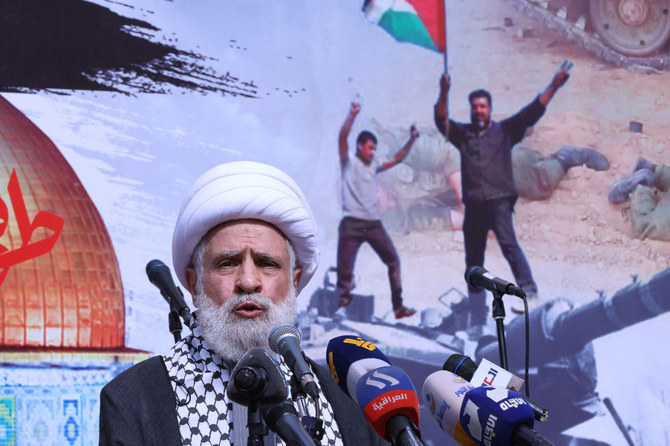
- ARAB NEWS
- 05 Jul 2025

As the horrors of war unfold in Gaza following Hamas’ terror attack on Israeli civilians, the north of Israel and its border with Lebanon should not be forgotten. The main question here remains: will Iran’s proxy Hezbollah join the attack? No one has the answer on how this conflict will evolve. But there is a single certainty: Hezbollah will never play as second in command under Hamas. It will not get fully into this war unless it has leadership for operations on the ground and is the sole “negotiator.” This is the only symbolic status Hezbollah will accept, while it actually represents the mullahs’ interests.
In short — and while we all ignore the probability and the real determining factors that could lead to this line of events — this means that Hezbollah would need to be the voice of the so-called resistance. This would also mean a broader engagement, if not a direct one, for the Islamic Revolutionary Guard Corps. It would be more than a two-front war this time. This would certainly wreak havoc to Lebanon once again.
When looking at the world today, whether the war in Ukraine, the situation between Armenia and Azerbaijan or the north of Syria, we notice shifting geopolitical sand and volatile situations. And so, any action by Hezbollah to enter the conflict would make the 2006 war look like a dress rehearsal. Until now, the rocket launches from Hezbollah have been a sign of support to Hamas without any real intention of getting into the conflict. Most analysts expect this to continue until Israel goes into Gaza, as Israeli Prime Minister Benjamin Netanyahu stated to US President Joe Biden. Then, there will be greater opportunities for Hezbollah to open a second front.
Any action by Hezbollah to enter the conflict would make the 2006 war look like a dress rehearsal
Khaled Abou Zahr
If this changes, then we have the 2006 war as a case study for how the situation would unfold. At that time, Hassan Nasrallah clearly positioned himself and Hezbollah as the unified commander of the two fronts in Gaza and Lebanon — the one who speaks and the one to contact for the negotiations regarding hostages. This positioning prompted the Israeli response that destroyed Lebanon. Indeed, Israel refused to let one party take over these two files, especially not Iran. And so, until this day, Lebanon is paying the price for these actions.
For now, the war in Gaza is only having a direct impact on Lebanese domestic politics. Indeed, a few days ago, Hezbollah’s motorcycles went roaming into well-known Christian neighborhoods and everyone understood the message. These motorcycle convoys come as a warning to the many voices that are clearly stating that Hezbollah should not drag Lebanon into this conflict, just as they dragged Lebanon into the Syrian conflict. These voices are echoed throughout Lebanon and this is a big difference from 2006. Hezbollah has lost a lot of its local support.
The Lebanese do not want to be dragged into regional conflict, they want to live. More precisely, they just want to survive. Most Lebanese believe that the Arab Peace Initiative should have been the way forward and that this could have brought stability to the region. This is why they do not want to act as a proxy in this war. If Hezbollah opened a second front, it would definitely give the negotiating cards to Tehran, meaning Hezbollah would act in the interests of Iran, not Lebanon. But the price of the devastation of war would be paid by all the Lebanese. Today, it is the people of the Levant that pay the highest price for these proxy wars.
Will Lebanon be dragged into this war? Will the Lebanese suffer once again? This time, the Lebanese are not accepting it and are making their voices heard loud and clear. But this does not mean they do not feel compassion for the situation. In all transparency, Lebanese citizens should firmly reject serving as proxies in any foreign conflict, particularly on behalf of Iran, considering the profound historical context and current delicate geopolitical landscape. For too long, Lebanon has paid a heavy price.
Destruction is the only result achieved when we allow the country to be used as a proxy for foreign powers
Khaled Abou Zahr
Lebanon’s history has been marked by foreign interference and this has led to devastating wars in the interests of others. Without going back too far, the Lebanese Civil War had disastrous consequences. It is high time we stopped allowing any force to undermine the nation’s sovereignty and independence. Destruction is the only result achieved when we allow the country to be used as a proxy for foreign powers. There is no freedom fighting. There is no honor. There is only death and destruction. Iran knows it and Hezbollah does too.
Hence, the Lebanese must absolutely stand against such involvement, as we have suffered enough for others and paid the price in sectarian massacres, the crippling economic situation and horrifying humanitarian costs. We have barely healed our wounds. In fact, the wounds are still wide open. We need to clearly say “no” to Hezbollah engaging an entire nation in war.
It is time to put an end to the proxy game in this small country, as it is a clear and pressing danger to the future of Lebanon. Beyond dragging the country into conflict, Hezbollah has deepened sectarian divisions and hindered national unity. This is why the Lebanese should unite and reject any proxy group to safeguard the country’s security, sovereignty and economic stability.